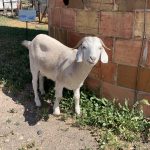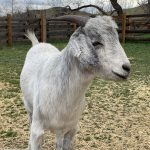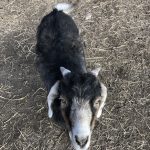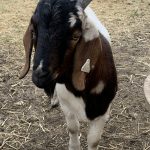



Meet our goats
- We have 4 male Spanish & Boer goats.
- Their names are Bumble (all white), Gandalf the Grey (grey), Puck (black’ish gray), and Snoopy (white body, brown head).
- Bumble and Gandolf are Spanish goats and Puck and Snoopy are Boer goats.
- They do not produce milk.
- They are wethered (castrated).
- As of June 2021 they will be 3 years old.
Care Instructions
- The number one thing about goats is to close all gates, doors and lids before exiting. A forgetful moment means a goat in the food bin and they will escape. Yes, they are that smart.
- Please provide 1.5 lbs. of Timothy grass for each grass feeder/dispenser for the AM and PM feedings. Use the hanging scale and orange bucket to weigh the grass. Upon completion of grass feeding, please take down the scale and hooks and store them in the orange tub near the grass bales.
- Please replace water in orange buckets in AM and top off water in the PM
- DO NOT feed goats anything that is not provided and stored in the loafing shed/feed area, especially chicken feed which is TOXIC to goats.
Conditions to be aware of
- Goats can bloat (excessive fermentation in the rumen/stomach). This is fatal if not treated right away. There are a number of things that can cause bloat including wrong food or forage and cold water. Please only feed what is provided by the Foundation.
- Contact Elizabeth Matthews (720) 233-4337 or Tamra Hirschman (303) 917-5126 if the goat appears lethargic or is acting out of character. Excessive crying is considered out of character and can be a symptom of bloat. Other signs of bloat are respiratory distress/labored breathing, stretching the neck to breathe, abnormally enlarged left side belly that sounds hollow when tapped. Also, contact if you notice any unusual bumps, growths, abrasions, abscesses, lesions, rashes, etc. Typical breaths per minute of a goat their age is 30-40.
Vet Contact (Call Elizabeth or Tamra before calling vet)
Dr. Brian Eitelman
Aggie Vet & Farrier Services
(720) 339-4187
